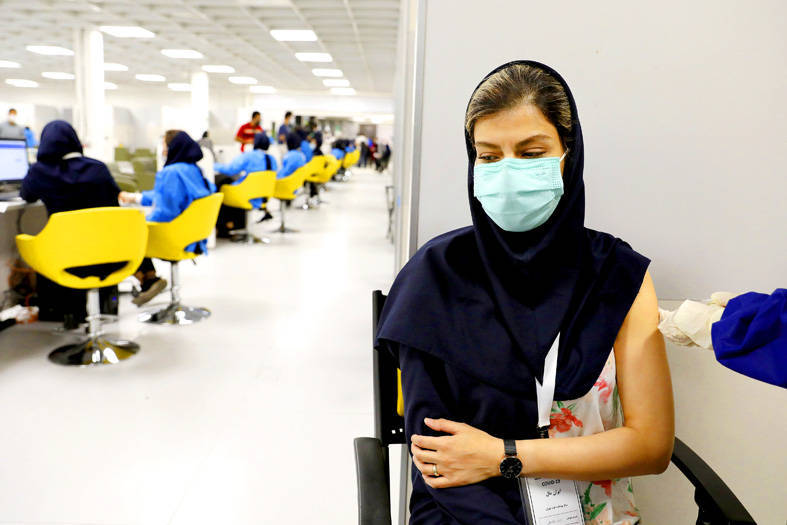《TAIPEI TIMES》 Vaccinations ‘outpaced by variants,’ WHO warns

A medical worker receives the Sinopharm COVID-19 vaccine at the Iran Mall shopping center in Tehran on May 17. Photo: AP
/ The Observer
Rich nations are sharing vaccines with low-income countries too slowly to prevent the spread of the Delta variant of SARS-CoV-2, risking millions of lives, WHO Director-General Tedros Adhanom Ghebreyesus has said.
Tedros said the sharing of vaccines was “only a trickle, which is being outpaced by variants,” after it emerged that the Delta variant is present in at least 98 countries.
His warning came as Dame Sarah Gilbert, the Oxford professor who led the team behind the Oxford-AstraZeneca vaccine, called for caution over proposals to vaccinate children in the UK.
“We have to balance what we think about vaccinating children in high-income countries with vaccinating the rest of the world, because we need to stop transmission of this virus globally,” she said.
“We’re not completely out of the woods and that’s why I’m very worried about getting vaccines around the rest of the world, because we need to stop the virus being transmitted and continuing to evolve. That could give us a new variant that is going to be really difficult to deal with,” Gilbert said.
Tedros said world leaders must ensure that at least 10 percent of people in all countries be vaccinated by the end of September, so that vulnerable people and health workers were protected.
“The Delta variant is dangerous and is continuing to evolve and mutate, which requires constant evaluation and careful adjustment of the public health response,” Tedros said. “Delta has been detected in at least 98 countries, and is spreading quickly in countries with low and high vaccination coverage.”
“The world must equitably share protective gear, oxygen, tests, treatments and vaccines,” he said.
By July next year, 70 percent of people in every country should be vaccinated, he added.
“This is the best way to slow the pandemic, save lives and drive a truly global economic recovery, and along the way prevent further dangerous variants from getting the upper hand,” he said.
This point was backed by James Naismith, director of the Rosalind Franklin Institute, Oxford.
“Delta is going to sweep through the EU in much the same way as here. Fortunately, they too are vaccinating at a very fast rate, and like the UK are probably just past the point of maximum danger, though summer will be rough,” Naismith said.
“But with so few people in developing countries vaccinated, their point of maximum danger is ahead. Once Delta gets going, it will overwhelm healthcare systems very rapidly unless vaccination improves,” he said.
“More thought needs to be given to whether vaccinating young children in the rich world is as important and ethically justified as vaccinating key workers and the most vulnerable in developing countries,” he added.
David Bauer, group leader of the RNA Virus Replication Laboratory at the Francis Crick Institute, said: “From a virology perspective, it’s very very clear — the Delta variant is going to displace all the other variants that currently exist.”
“We need everybody vaccinated now. We are not all protected until the whole world is protected. It can come across as idealism, but it’s not — there’s a cold-hearted, self-interested motivation behind all of it,” he added.
新聞來源:TAIPEI TIMES



















